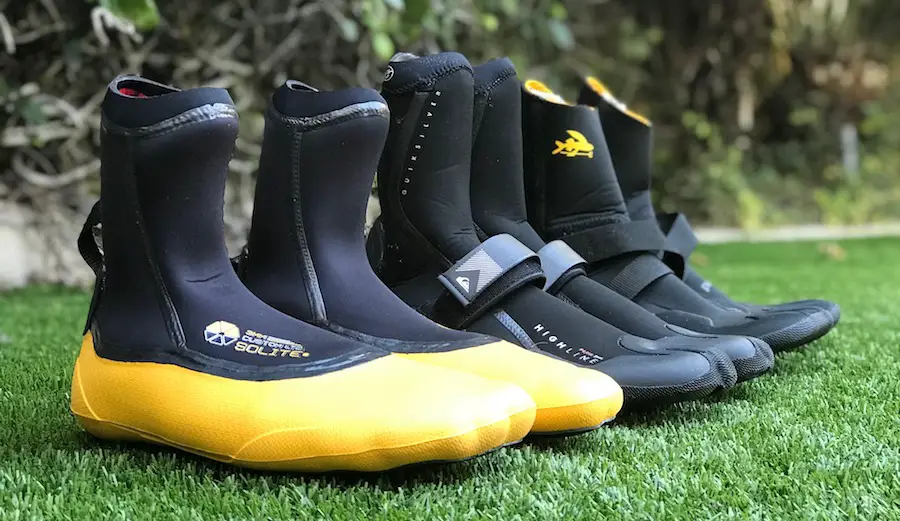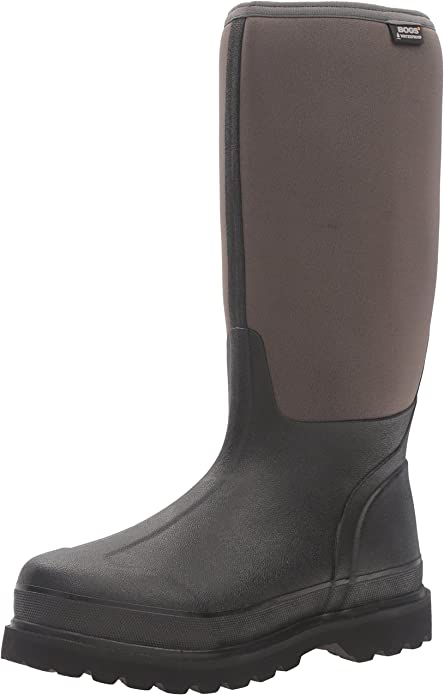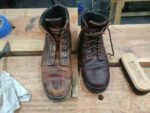You need a pair of boots that can withstand the cold and snow now that winter is arriving.
Because of their waterproof nature, rubber boots are preferred because they can withstand the muddy, wet conditions that winter brings.
But are they warm?
Well yes.
Rubber boots can keep you warm in chilly weather because they act as a moderate heat insulator. However, you’ll need an insulated rubber boot for colder, more severe conditions.

Are rubber boots warm enough?
Rubber boots are the first thing we go for when it rains.
We can easily go outside and trample through sizable water puddles without any concern while wearing rubber boots. Because we are confident that our feet will stay dry.
But when winter arrives, it is not only sufficient to stay dry but also warm.
And if you spend the entire day walking around in the snow, rubber boots, especially insulated rubber boots will be able to prevent your toes from developing frostbite.
Do rubber boots work well in the snow?
Rubber boots are excellent for use in snowy conditions because they are waterproof and resistant to damage, unlike some types of leather boots.
Additionally, they do offer a decent amount of warmth.
But if you intend to wear rubber boots in the snow, there are a few things to think about:
First, how long will you be in the snow?
As we’ve already discussed, insulated rubber boots are the better choice if you’ll be spending a lot of time in below-freezing temperatures.
But rubber is a great choice if you are just running quick errands and need a boot to handle the snowy weather.
Second, make sure the rubber boot has the appropriate traction and outsole for walking in a slick, wet environment.
Although there are some exceptions, most rubber boots do have good traction. It can be beneficial to have a heel that is slightly raised to offer additional slip protection.
See also: Why Are Leathers Soles More Slippery Than Rubber Soles?
The insulation of rubber boots: An overview
A pair of rubber boots will work fine if you only intend to wear them during the rainy season.
However, a good pair of insulated rubber boots are necessary for venturing outside during the extremely chilly winter months.
Your feet and the motion you make as you move around in your boots produce heat.
However, a large portion of this heat will be lost through the boot’s top and the boot itself. Therefore, insulation is useful in this situation.
What kind of insulation are your rubber winter boots made of?
Let’s go over the two most common types of rubber boot linings for winter.
Neoprene

Neoprene is a strong, supple, and elastic sponge rubber that has outstanding chemical resistance.
Your feet are protected from moisture and the cold by neoprene, as well.
Neoprene consists of little nitrogen gas bubbles, which have very poor thermal conductivity.
As a result, there is significantly less heat transfer between your feet and the chilly air or water outside.
Foam
In order to add warmth, some rubber boots will use foam insulation around the foot.
Artificial insulation
3M Thinsulate is one of the most widely used materials for rubber boot insulation.
This synthetic material is lightweight and non-bulky, and it has excellent heat-trapping capabilities.
Due to the non-bulky nature of synthetic insulation, it enables companies to line the boot without significantly altering the form and shape of the boot, which is why it is so popular.
For work boots, this type of insulation is typically found in 200g, 400g, and 600g forms.
However, some extreme boots may use 1000g or more.
See also: How to Reshape Rubber Boots?
Liners or socks
Your rubber boots appear to accomplish all of your goals, save for keeping your feet warm.
However, you can easily increase the amount of heat retained by wearing a pair of liners or socks.
You’ll need socks that are at least as tall as your boots. The best options are wool blend socks, but you must ensure that they contain at least 60% wool.
Why are rubber boots with insulation best for winter warmth?
You should invest in a high-quality pair of insulated rubber boots rather than non-insulated ones if your goal is to have a pair of footwear you can use outside during the harsh winter months.
Since the insulation material helps slow the movement of heat through the rubber of the boot, insulated rubber boots are more effective at keeping your feet warm.
As a result, it provides your feet with comfortable warmth even in below-freezing temperatures when you match the right amount of insulation to your climate and level of activity.
The 5 best rubber boots with insulation to prevent cold and water
1.) BOGS Rancher Cool Snow Boot

The full-length construction of these Bogs boots guarantees that your feet remain covered from the toes to the ankle.
Additionally, they contain a 7mm neoprene liner with antifungal properties which is effective in keeping the feet dry and free of foot diseases.
Finally, they have a rubber outsole with a lug design that provides excellent traction by giving enough grip on slippery and angled surfaces, lowering the likelihood of falling and slipping.
2.) TIDEWE Rubber Waterproof Insulated Boots
- 100% Waterproof
- Breathable & Warm
- Comfortable & Anti-Slip
- Durable & User-Friendly
Prices pulled from the Amazon Product Advertising API on:
Product prices and availability are accurate as of the date/time indicated and are subject to change. Any price and availability information displayed on [relevant Amazon Site(s), as applicable] at the time of purchase will apply to the purchase of this product.
These boots are incredibly lightweight and comfortable to wear while walking.
Your feet will not slide around in the foot bed because they fit well, which gives good stability.
They are strong and waterproof. The fact that the back of the heel has a small notch that you can use with the other foot to help pull the boot off without using your hands is a good feature.
3.) ALEADER Insulated Waterproof Rubber Boots
- Cushioned footbed for supportive comfort. All-cold weather protection and a toasty layer of insulation.
- Easy pull on with both a drawstring and ankle strap.
- Seam-sealed, waterproof outsole keeps feet dry in wet conditions. Perfect for all outdoor winter activities.
- Stomp around town even when the rain and cold tries to slow you down with the durable and comfortable ALEADER rain boot
Prices pulled from the Amazon Product Advertising API on:
Product prices and availability are accurate as of the date/time indicated and are subject to change. Any price and availability information displayed on [relevant Amazon Site(s), as applicable] at the time of purchase will apply to the purchase of this product.
This pair of boots offer 100 percent water protection.
I believe that the PVC material used to provide resistance to corrosive chemicals and barnyard wastes makes this possible.
Additionally, these boots have a non-skid outsole with numerous biting edges that offer excellent traction. This is crucial for preventing falls.
4.) ArcticShield Cold Weather Waterproof Rubber Boots
- COLD WEATHER RATED TO -40° F: 8MM REMOVABLE THERMAL LINER
- WATERPROOF
- RUGGED ALL TERRAIN OUTSOLES
- PATENTED RETAIN TECHNOLOGY
- LIGHTWEIGHT AND COMFORTABLE
Prices pulled from the Amazon Product Advertising API on:
Product prices and availability are accurate as of the date/time indicated and are subject to change. Any price and availability information displayed on [relevant Amazon Site(s), as applicable] at the time of purchase will apply to the purchase of this product.
Up to 90% of your body’s heat is captured and returned by the heat-resistant Arctic Shield insulation, keeping cool outside air out and radiating body heat in.
Additionally, this inexpensive insulation does a far better job of keeping you warm than other, more expensive insulations that merely slow the loss of body heat.
It keeps you warm whether you’re outdoors shoveling your way out of the next blizzard or trekking in cool weather.
5.) Kamik Men’s Icebreaker Insulated Winter Boot
- 100% Waterproof
- -40F Extreme Temperature Rating
- Removable 8mm thermal guard liner
- Oil- and acid-resistant
- Made in Canada
Prices pulled from the Amazon Product Advertising API on:
Product prices and availability are accurate as of the date/time indicated and are subject to change. Any price and availability information displayed on [relevant Amazon Site(s), as applicable] at the time of purchase will apply to the purchase of this product.
You can easily work in a snowy and wet environment with no issues because these boots are made of waterproof and incredibly light synthetic rubber.
It also comes with a Kamik’s Tacker Synthetic outsole, which gives enough traction even in clement weather.
Because of the outsole’s high level of protection, you will be confident while moving around on slick surfaces without concern for falling.
These rubber boots are the ideal fusion of fashion and comfort. There aren’t any other ways to describe it.
Comparison table
Check out this comparison table:
| Brand | Comfort | Durability | Insulation | Safety |
| BOGS Rancher Cool Snow Boot | 10 | 9 | 8 | 9 |
| TIDEWE Rubber Waterproof Insulated Boots | 10 | 8 | 8 | 9 |
| ALEADER Insulated Waterproof Rubber Boots | 9 | 9 | 9 | 9 |
| ArcticShield Cold Weather Waterproof Rubber Boots | 8 | 10 | 9 | 10 |
| Kamik Men’s Icebreaker Insulated Winter Boot | 8 | 9 | 10 | 9 |
Conclusion
Your everyday rubber boots will keep your feet warm enough in mild cold. But if you need boots for extremely cold weather, choose insulated rubber boots.
According to our experience, wearing insulated rubber boots with a set of heavy wool winter socks is the best way to keep your feet warm while wearing rubber boots.











